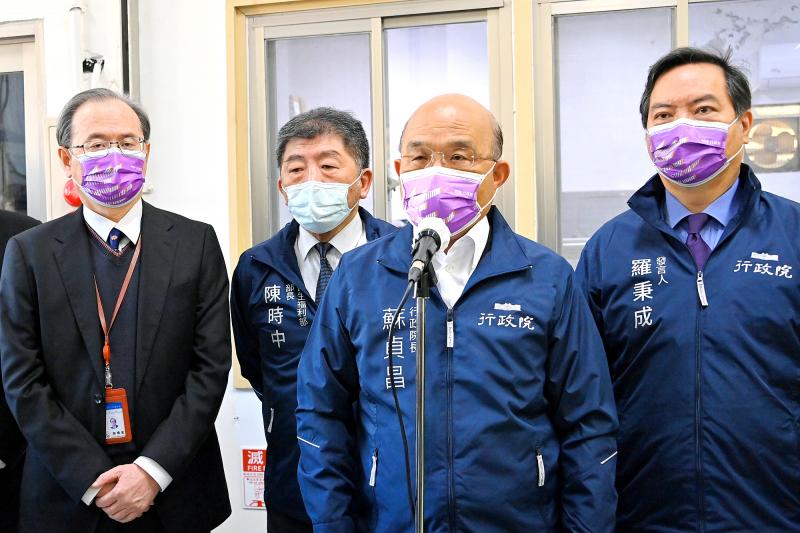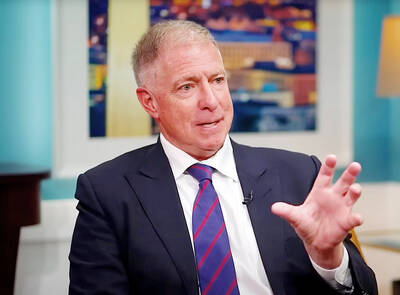Taiwan has seven certified laboratories that have the capacity to inspect 70,000 food products per year, Premier Su Tseng-chang (蘇貞昌) said yesterday in a bid to assure the public about food safety.
After the government on Tuesday announced an end to an 11-year ban on food from Fukushima, Gunma, Chiba, Ibaraki and Tochigi prefectures that was implemented after the 2011 Fukushima Dai-ichi nuclear power plant disaster, Su yesterday inspected the food radiation testing laboratory at the Atomic Energy Council’s Institute of Nuclear Energy Research (INER) in Taoyuan.
The nation has seven laboratories certified by international organizations for testing radioactive residues in food products, Su said.

Photo courtesy of the Executive Yuan via CNA
“Now we have set up this ‘national team’ for testing radioactive residues, we have the capacity to test up to 70,000 food products per year, and the results can be certified and accepted in Taiwan and other nations,” he said.
Testing is expected to occur on about 20,000 food products per year, with a capacity of 70,000, he added.
“I can assure the public that Taiwan can handle the testing without a problem and can safeguard food safety,” Su said.
INER Health Physics Division director Wang Cheng-chung (王正忠) said the facilities have been approved by the International Atomic Energy Agency after passing comparison tests of radiation samples.
Besides INER, the other six laboratories are in New Taipei City, at National Tsing Hua University, at National Yang Ming Chiao Tung University in Hsinchu City, the Food and Drug Administration’s central Taiwan office in Taichung, at National Pingtung University of Science and Technology and in Kaohsiung, Wang said.
Testing is conducted by a team of 16 at INER using seven high-purity germanium coaxial detectors, which currently test 35,200 samples annually, he said, adding that it can ramp up capacity by purchasing three new detectors.
The past decade’s testing of 180,000 samples had turned up only 236 products with low radiation levels well below safety limits, or a detection rate of just over 10 per 10,000 samples, Wang said.
The instruments have a detection limit for cesium-134 and cesium-137 of 1 becquerel per kilogram, which is 1 percent of the legal limit for food products, he said.
Additional reporting by Jason Pan

The Grand Hotel Taipei on Saturday confirmed that its information system had been illegally accessed and expressed its deepest apologies for the concern it has caused its customers, adding that the issue is being investigated by the Ministry of Justice Investigation Bureau. The hotel said that on Tuesday last week, it had discovered an external illegal intrusion into its information system. An initial digital forensic investigation confirmed that parts of the system had been accessed, it said, adding that the possibility that some customer data were stolen and leaked could not be ruled out. The actual scope and content of the affected data

DO THEY BITE IT? Cats have better memories than people might think, but their motivation is based entirely around the chance of getting fed Cats can remember the identity of the people who fed them the day before, Taipei-based veterinarians said on Friday, debunking a popular myth that cats have a short memory. If a stray does not recognize the person who fed them the previous day, it is likely because they are not carrying food and the cat has no reason to recognize them, said Wu Chou Animal Hospital head Chen Chen-huan (陳震寰). “When cats come to a human bearing food, it is coming for the food, not the person,” he said. “The food is the key.” Since the cat’s attention is on the food, it

A New York-based NGO has launched a global initiative to rename the nation’s overseas missions, most of which operate under the name "Taipei," to "Taiwan Representative Office (TRO)," according to a news release. Ming Chiang (江明信), CEO of Hello Taiwan, announced the campaign at a news conference in Berlin on Monday, coinciding with the World Forum held from Monday through Wednesday, the institution stated in the release. Speaking at the event, Democratic Progressive Party Legislator Huang Jie (黃捷) said she believed this renaming campaign would enable the international community to see Taiwan

DEFENSE: The US should cancel the US visas or green cards of relatives of KMT and TPP lawmakers who have been blocking the budget, Grant Newsham said A retired US Marine Corps officer has suggested canceling the US green cards and visas of relatives of opposition Taiwanese lawmakers who have been stalling the review of a proposed NT$1.25 trillion (US$39.7 billion) special defense budget. The Executive Yuan has proposed the budget for major weapons purchases over eight years, from this year to 2033. However, opposition lawmakers have refused to review the proposal, demanding that President William Lai (賴清德) first appear before the Legislative Yuan to answer questions about the proposed budget. On Thursday last week, 37 bipartisan US lawmakers sent a letter to Legislative Speaker Han Kuo-yu (韓國瑜), the heads